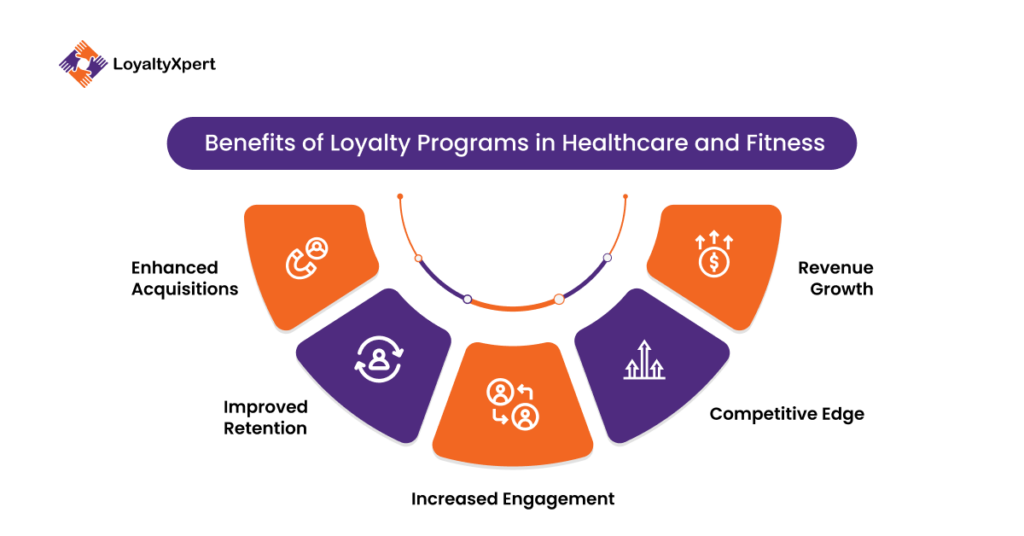Patient retention is a crucial factor for healthcare businesses and the same goes for fitness companies with customer retention. Customer loyalty in healthcare and fitness is important as it helps retain customers and increases revenue.
Increasing churn rates has become a concerning challenge for many healthcare and fitness businesses. According to a Patient Pop’s Survey Report, nearly 80% of patients cited poor in-person experience and poor communication as the main reasons for switching healthcare providers.
In today’s day and age, patients are more aware and they expect an optimal, personalized experience. So, how can you ensure customer loyalty and retention? Customer loyalty programs can help you achieve that, making it a valuable part of your strategies to retain customers and foster loyalty. Healthcare loyalty programs are a customer-centric approach to enhancing customer satisfaction and fostering long-term relationships.
This guide focuses on exploring concepts of healthcare loyalty programs and why customer loyalty programs are a must in the healthcare and fitness industries. It also discusses the components that make a successful loyalty program.
Customer Loyalty Programs in Healthcare and Fitness
Customer loyalty programs or healthcare loyalty programs are customer-centric, strategic initiatives designed to offer incentives and rewards for patient loyalty.
Just like loyalty programs in other industries, fitness, and healthcare loyalty programs focus on building long-term relationships with customers and patients by enhancing their experience and incentivizing them to continue using the services. However, unlike other industries, these programs in the healthcare and fitness industries also aim to promote wellness and health.
Whether it’s a hospital or clinic, healthcare loyalty programs are designed to suit different needs and budgets. The advanced customer loyalty program platforms enable healthcare providers to customize loyalty programs based on their needs and preferences. This also allows you to provide tailored experiences to your patients and members. Let’s take a look at two examples:
- A fitness app may offer reward points to its members who achieve a fitness milestone. Members can then redeem these reward points for merchandise or membership discounts.
- A healthcare loyalty program might reward patients for regular check-ups or participating in wellness events.
Let’s understand what makes loyalty programs crucial in healthcare and fitness.

Benefits of Loyalty Programs in Healthcare and Fitness
The healthcare and fitness industry faces numerous challenges, including:
- Patient retention
- Client engagement
- Customer satisfaction
You can address these challenges by building a fitness and healthcare loyalty program. Here’s how these programs can benefit you:
1. Enhanced Acquisitions
A well-designed loyalty program that is also customer-centric can help with acquisition. When a program offers unique and relevant incentives and rewards, it helps the business differentiate itself from the competition. This helps in improving customer/patient satisfaction and experience, which makes them more likely to stay loyal to the healthcare/fitness organization.
You can encourage the members through the fitness and healthcare reward programs to share positive feedback and reviews. In addition, rewarding your members for every referral can help acquire new members and increase revenue.
2. Improved Retention
By fostering a sense of loyalty and engagement among your existing members, you can increase retention. Customer loyalty programs that are user-friendly and offer relevant and personalized rewards and incentives for continued engagement encourage members to keep returning, hence, reducing churn rates.
Healthcare institutions can also reward their patients for adhering to treatment plans and recommending their services to others. Members who are loyal are more likely to stay with your practice, making customer loyalty in healthcare important.
3. Increased Engagement
In the healthcare industry, patient engagement refers to the active involvement of patients in their respective healthcare plans. This is beneficial for both healthcare providers and patients, as it results in better health results for the patients while increasing their loyalty to the healthcare providers.
In the fitness industry, members of customer loyalty programs can earn rewards or incentives for achieving various fitness goals or attending wellness classes. Similar to healthcare loyalty programs, fitness loyalty programs also benefit the fitness centers as well as the customers.
4. Competitive Edge
There’s a lot of competition in the fitness and healthcare industries with every business trying to grab the attention of customers. A loyalty program provides your business with a critical edge, enabling your business to stand out from the competition by offering personalized experiences.
One key advantage of robust loyalty programs is that they provide you with valuable member (patient) data and insights. You can leverage this data to provide your customers with personalized rewards and incentives, making them feel valued and understood. This fosters a deep connection with your customers, leading to enhanced loyalty.
For example, a report from 2023 mentioned that Cancer Research UK leveraged insights and data from loyalty cards to spot the risk of ovarian cancer in women.
5. Revenue Growth
Businesses in the fitness and healthcare industry can witness increased ROI through a well-built loyalty program. You can expand your customer base and increase repeat visits, which results in increased revenue.
Customer loyalty programs tackle industry challenges head-on to offer tailored benefits. This has made loyalty programs a must in the healthcare and fitness industries.
Types of Loyalty Programs for Healthcare and Fitness
There are various types of loyalty programs that businesses can choose from. However, choosing the right one is important to get the desired results. Here are some of the fitness and healthcare loyalty programs that you can choose from depending on your requirements:
1. Point-Based Programs:
Patients or members of this loyalty program can earn points for their engagement. These points can be redeemed in the form of rewards or discounts on future services.
- Example: Aetna’s Better Health Rewards program enables its members to earn points for their engagement, like appearing for annual wellness exams, taking part in online health assessments, and more.
2. Tiered Loyalty Programs:
This type of loyalty program includes different loyalty tiers that incentivize customers as they reach higher levels. Incentives may include offering access to premium services.
- Example: Motion, a tiered loyalty program offered by UnitedHealthcare, focuses on incentivizing and rewards its members for taking part in physical activities and choosing to follow healthy habits.
3. Subscription and Membership Programs:
You can give exclusive access, priority scheduling, and other benefits to the members of the program by offering paid memberships. This type of model ensures a steady revenue stream.
- Example: Parsley Health, a membership-based healthcare provider. By paying a monthly or annual fee, patients get access to personalized health plans, advanced testing, and more.
4. Referral Programs
By integrating referrals, you can make your patients/customers your brand ambassadors. This involves rewarding the new member as well as the member who referred.
5. Wellness Challenges and Rewards:
These programs are particularly effective in the fitness industry, as they reward members as they achieve health milestones. In the healthcare industry, this program promotes a holistic approach to healthcare by offering access to fitness classes, nutrition consultations, and more to improve overall well-being.
- Example: Blue365, a wellness program that provides its members with exclusive offers and discounts on various wellness services and products.
Key Components of Loyalty Programs
:- User-Friendly Interface:
Having an intuitive platform enables you to increase customer engagement, as it enhances their experience. Whether the members are accessing the rewards through mobile apps or websites, it should be easy to navigate.
:- Personalization:
By leveraging data and insights from customer loyalty programs, you can customize rewards, making them more appealing to members.
:- Omnichannel Accessibility:
To ensure that your customers can engage with your fitness and healthcare loyalty program, consider offering access across platforms, including through apps, websites, and in-person interactions.
:- Data Security and Compliance:
In the healthcare industry, it’s crucial to adhere to legal frameworks and regulations like HIPAA. By protecting the data of your customers/patients, you can build and maintain their trust.
While it’s important to keep all key components of a successful loyalty program in mind, implementing a customer loyalty program can be tricky. Here are the best practices to implement loyalty programs successfully:
- Define and set clear objectives for your program
- Adopt advanced loyalty program software to build an effective program
- Ensure employees are familiar with the program to promote it effectively and assist customers
- Regular review helps in identifying areas for improvement and making necessary adjustments
Embracing Loyalty Programs for a Healthier Future
Implementing customer loyalty programs can offer you a competitive advantage and assist you in thriving in the healthcare and fitness industry. These programs are effective in fostering stronger and long-term relationships with customers leading to increased ROI.
Loyalty Xpert provides a robust loyalty management platform to create personalized and rewarding experiences for your customers. To learn more about how Loyalty Xpert can assist you, book a free demo now!
FAQs
1. How do loyalty programs improve patient experiences in healthcare?
Loyalty programs foster trust while encouraging adherence to treatment plans by offering rewards and incentives for continuous engagement.
2. What benefits do loyalty programs bring to healthcare providers?
Loyalty programs can have the following benefits for healthcare providers:
- Better patient retention
- Enhanced customer satisfaction
- Regulatory compliance
- Increased revenue
- Building patient trust
3. How can healthcare providers ensure compliance while using loyalty programs?
Here’s how providers ensure compliance while using loyalty programs:
- Adhering to data privacy regulations like HIPAA
- Using secure loyalty management platforms
- Ensuring transparent data practices
4. What types of rewards work best in fitness industry loyalty programs?
Effective rewards may include:
- Free classes
- Merchandise discounts
- Access to exclusive events
5. How do loyalty management platforms simplify program implementation?
Loyalty management platforms automate processes, track rewards, and provide actionable insights for personalized customer experience.

